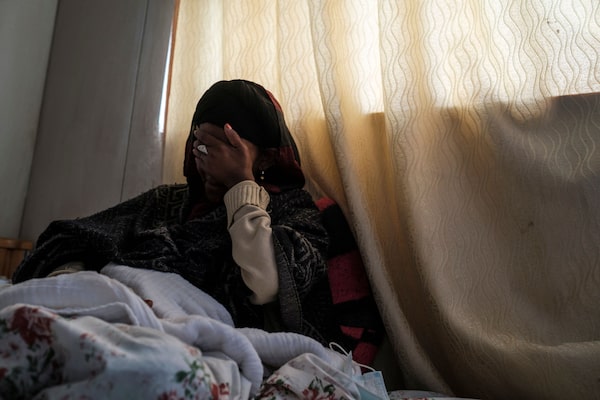
Berhan (not her real name) 30, originally from Edaga Hamus, sits at her bed in a hospital in in Mekele, Ethiopia on Feb. 27, 2021.EDUARDO SOTERAS/Getty Images
Health centres have counted more than 10,000 victims of sexual violence since the beginning of the war in Ethiopia’s Tigray region, including many who were attacked after the signing of a peace agreement, investigators say.
The perpetrators have operated with almost complete impunity from the law, the investigation found. Only 29 sexual-violence cases have been brought to Ethiopia’s military courts since the start of the Tigray war in 2020.
The 21-page report by an international commission of experts, appointed by the United Nations Human Rights Council, was published on Monday. The Ethiopian government is seeking to shut down the inquiry by persuading the human-rights council to end the probe’s mandate.
The international experts said they found evidence of crimes against humanity and war crimes by Eritrean and Ethiopian military forces and by militias from Ethiopia’s Amhara region – including crimes this year. They also found evidence of war crimes by Tigrayan forces.
For at least eight months after last November’s peace agreement, Eritrean and Amhara forces continued to commit rape and sexual violence in Tigray, the report said. It said it had credible information that more than 100 girls under the age of 18 were raped or subjected to brutal forms of sexual violence in Tigray after the peace deal, particularly in areas where Eritrean soldiers were present.
“The sexual violence crimes in this war are truly horrific,” said Radhika Coomaraswamy, one of the commission’s three experts.
“I have been to many conflicts, Rwanda and many others, and this was as bad as it gets,” she told a media briefing.
“It was extreme. It included gang rape. It included cruelty of the worst kind. … The worst of this was perpetrated by Eritrean forces in Tigray, though of course Ethiopian forces were also involved. There was also sexual violence in Amhara, perpetrated by Tigrayan forces, which were also quite terrible.”
Because so few of the crimes have been prosecuted, there is a significant risk of further atrocities across Ethiopia, the experts said.
“We’re concerned about the Eritrean forces who, according to our research, have committed the worst atrocities, especially with regard to sexual violence, especially in the border areas, and the prospect that they’ll face no accountability at all,” Ms. Coomaraswamy said.
The commission’s chairperson, Mohamed Chande Othman, said the prospects for accountability are “virtually non-existent” in Ethiopia today. The government, he said, is trying to evade international scrutiny by setting up domestic processes that have no credibility.
The Ethiopian government refused to allow the commission to enter the country, so the experts had to do most of their interviews remotely and in neighbouring countries. They interviewed 545 witnesses and analyzed more than 570 documents, including photos, videos, satellite images, medical records and public statements by officials.
While large-scale fighting in Tigray has ended since the signing of the peace agreement, the report said the conflict has continued to produce misery in the region, while new clashes have erupted in two other major regions of the country: Amhara and Oromia. “Hostilities in Ethiopia are now at a national scale,” it said.
Across the country this year, the investigators found large-scale arbitrary detentions of Amharas and other people, the growing militarization of civil authority, and the widespread use of hate speech.
Under the peace agreement, Ethiopia was required to ensure that Eritrean forces withdraw from Tigray, but Eritrean troops remain in the region today, the report said. Since the beginning of the conflict, it said, the Eritrean army has perpetrated large-scale killings of civilians, sexual assaults, attacks on refugee camps, indiscriminate shelling of civilian areas, destruction and looting of homes, and the blocking of humanitarian aid.
The investigators also expressed concern at hate speech by Ethiopian officials, who used words such as “cancer” and “invasive weeds” to describe their Tigrayan enemies. Perpetrators of atrocities often borrowed the same language. “Rapes were often accompanied by dehumanizing and ethnicized language,” the report said.
The UN Human Rights Council established the commission of experts in 2021 and renewed its mandate for another year in 2022. But human-rights groups are worried that Western governments might be willing to end its mandate, even though the commission is the only independent investigative body on war crimes in Ethiopia.
The council is expected to vote on the commission’s mandate early next month, deciding whether to renew it or shut it down.
The commission’s latest report “sends a clear warning that this is not the time for the UN to lower the accountability bar on Ethiopia,” said Tigere Chagutah, Amnesty International’s regional director for East Africa and Southern Africa, in a statement on Monday.
“Serious, ongoing human-rights abuses and the unfolding crisis in the Amhara region show that Ethiopia is at a dangerous precipice,” he said.
“Reducing scrutiny now would further embolden impunity and abandon victims of heinous violations and set a bad precedent for the UN’s ability to exercise meaningful scrutiny over human-rights crises in other parts of the world.”
 Geoffrey York
Geoffrey York